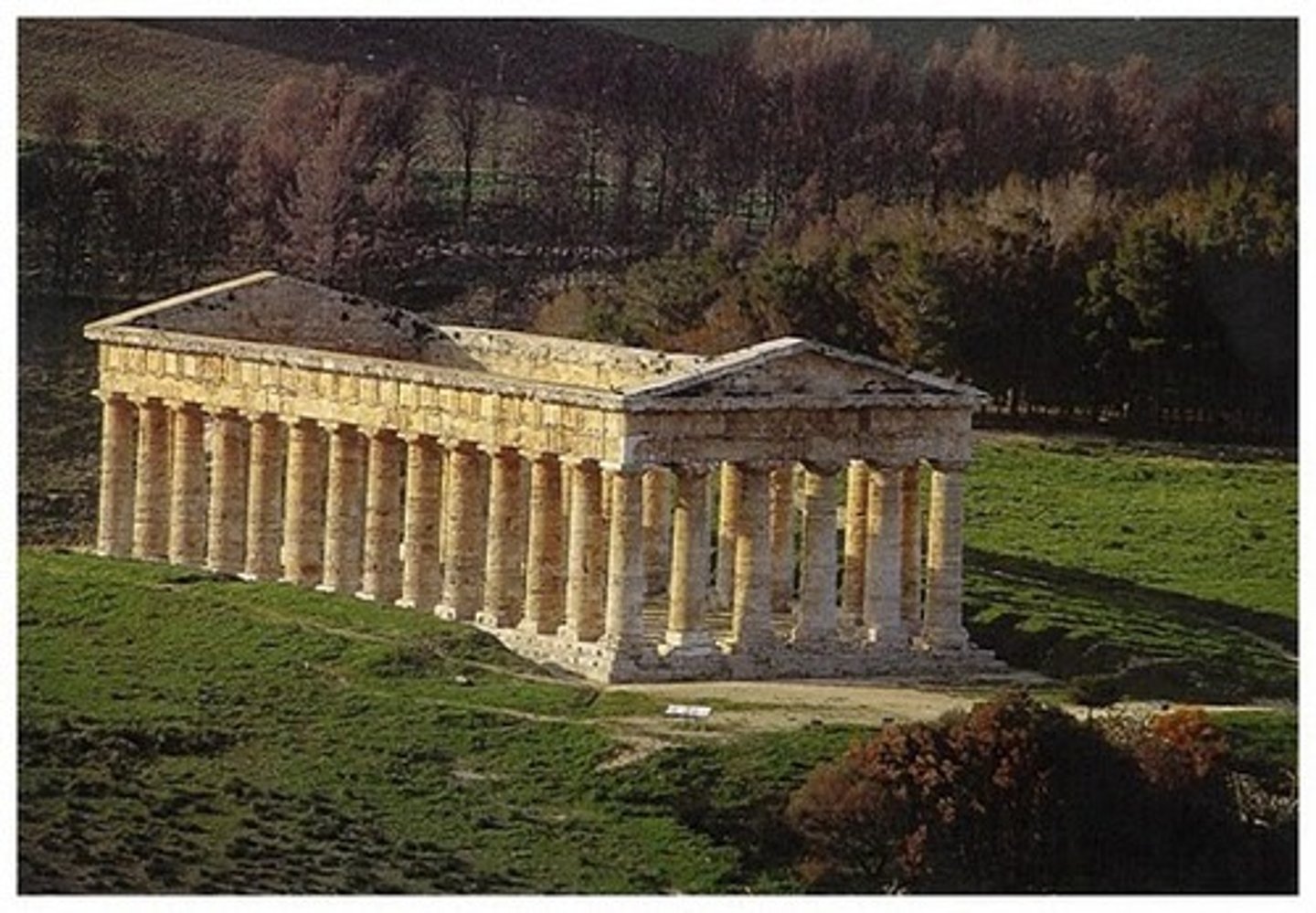CLCIV 101 FINAL
1/253
There's no tags or description
Looks like no tags are added yet.
Name | Mastery | Learn | Test | Matching | Spaced |
|---|
No study sessions yet.
254 Terms
Chorēgos
- Financial backer attached to a playwright to support the production of his plays
- Pericles was the chorēgos for Aeschylus' Persians in 472 BC
Stratēgos
- Greek military general
- Pericles was elected stratēgos in 462-429 BC (continuously from 443-429 BC)
Pericles (495-429 BC)
- Chorēgos for Aeschylus' Persians in 472 BC
- 462-429 BC: elected stratēgos (continuously from 443 to 429 BC)
- Building program (Acropolis, Parthenon, Phidias)
- Athenian IMPERIALISM in 440s-430s
Bust of Pericles (UNFINISHED)
- Roman copy after a Greek original from 430 BC
- CLASSICAL period
- Significance:
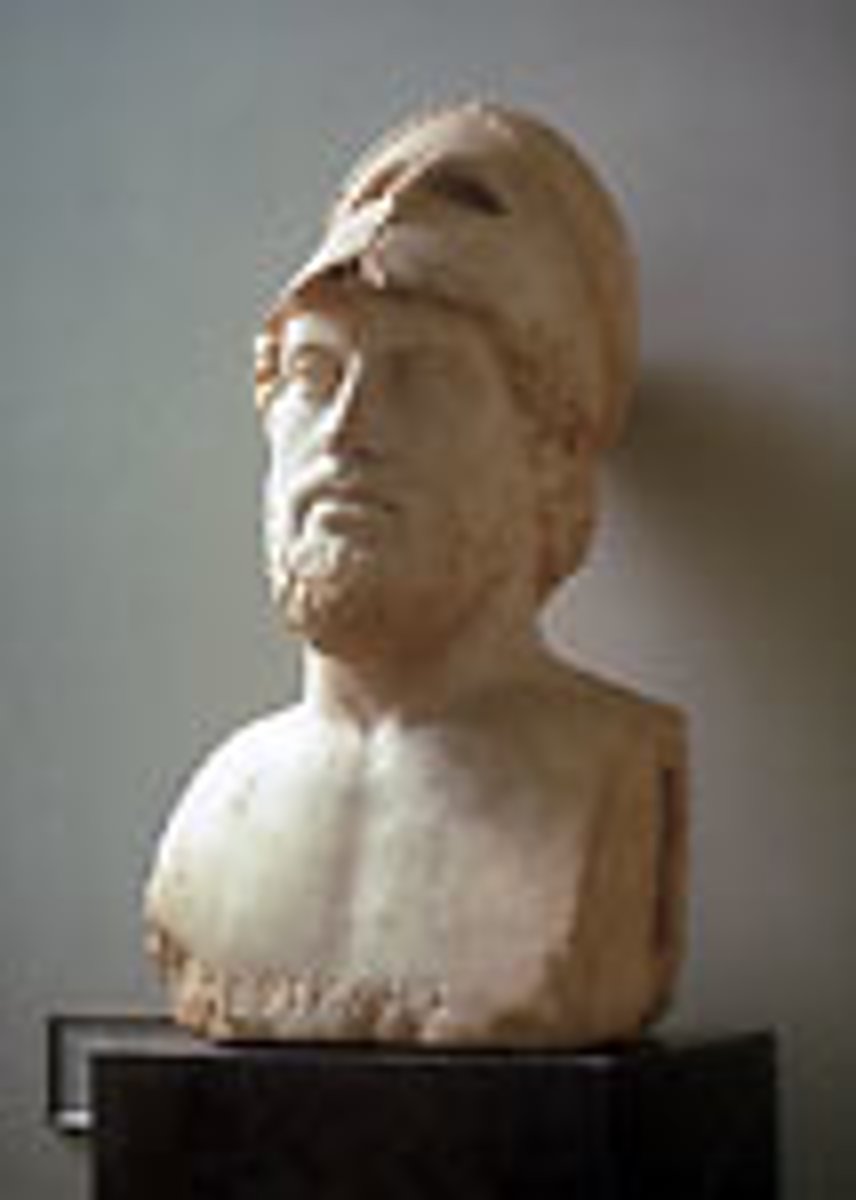
Delian League to Athenian Empire
- 477 BC: Delian league against Persians under leadership of Athens
- Gradual conversion of tribute payments from ships to MONEY (phoros)
- Treasury at Delos: located in the Aegean Sea above center of Crete at the bottom and southwest of Attica
- 454 BC: treasury of the Delian League TRANSFERRED from Delos to ATHENS under the PRETEXT that Athens was "more secure" against Persians and pirates
Thucydides on Athens and Her Allies
- Reason for revolts were failures to produce right amount of tribute/right number of ships
- Athenians were unpopular due to high and inflexible demands
- "Athenian navy grew STRONG at allies' expense" --> "when they revolted they always found themselves the inadequately armed and inexperienced in war"
Athenian Tribute Lists
- c. 450 BC, CLASSICAL period, erected on Acropolis (Athens, Greece)
- Records of the 1/60th of the tributes dedicated to Athena
- Symbolic value: not really a religious list --> served as propaganda for Athenian wealth and power
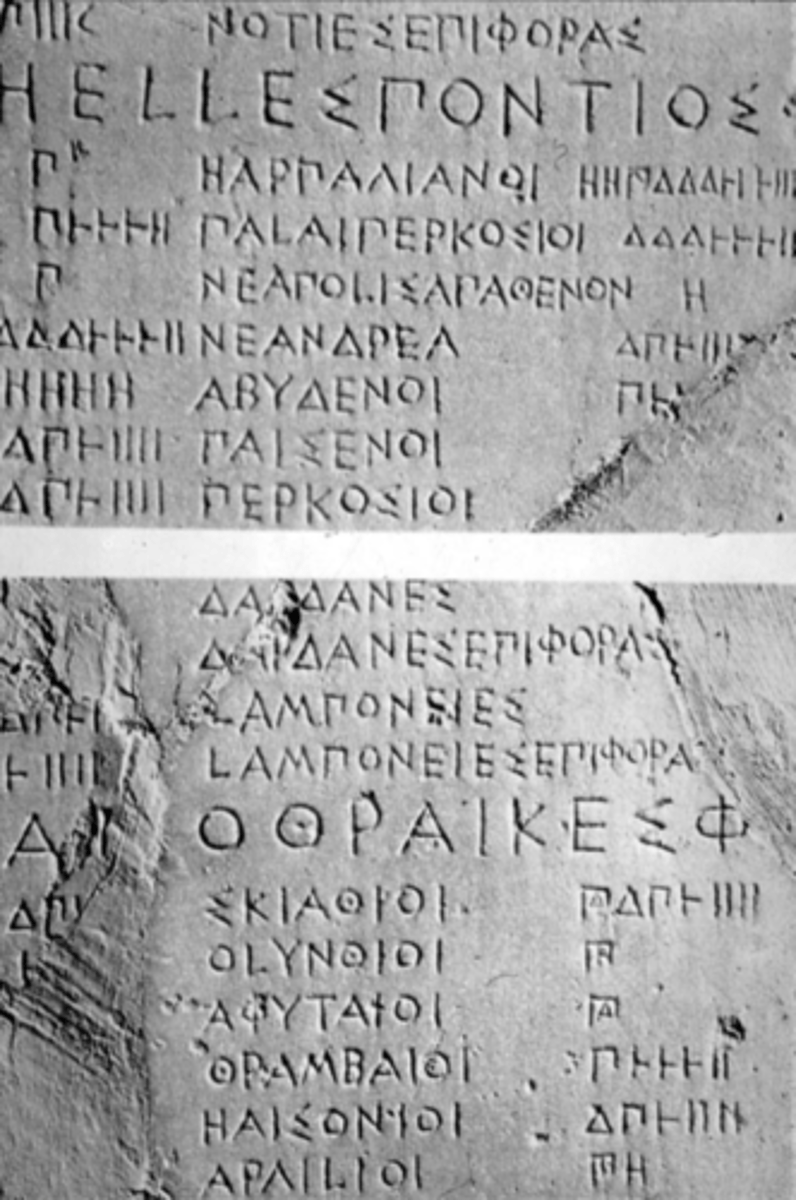
Acropolis
- Built under Pericles as stratēgos during the Classical Period
- Located in Athens, Greece
- Erechtheum (421-407 BC, Classical Period)
- Acropolis, Propylae, & Temple of Athena Nike (437-420 BC, Classical Period)
- Temple of Athena Nike (c. 422 BC, Classical Period)
- Parthenon (477-432 BC, Classical Period)
- Symbol of Greek wealth and architectural advancement, in addition to being a cultural and religious center (reflected Greek polytheism and beliefs)
- Place to remember the PAST --> ATHENS REBORN
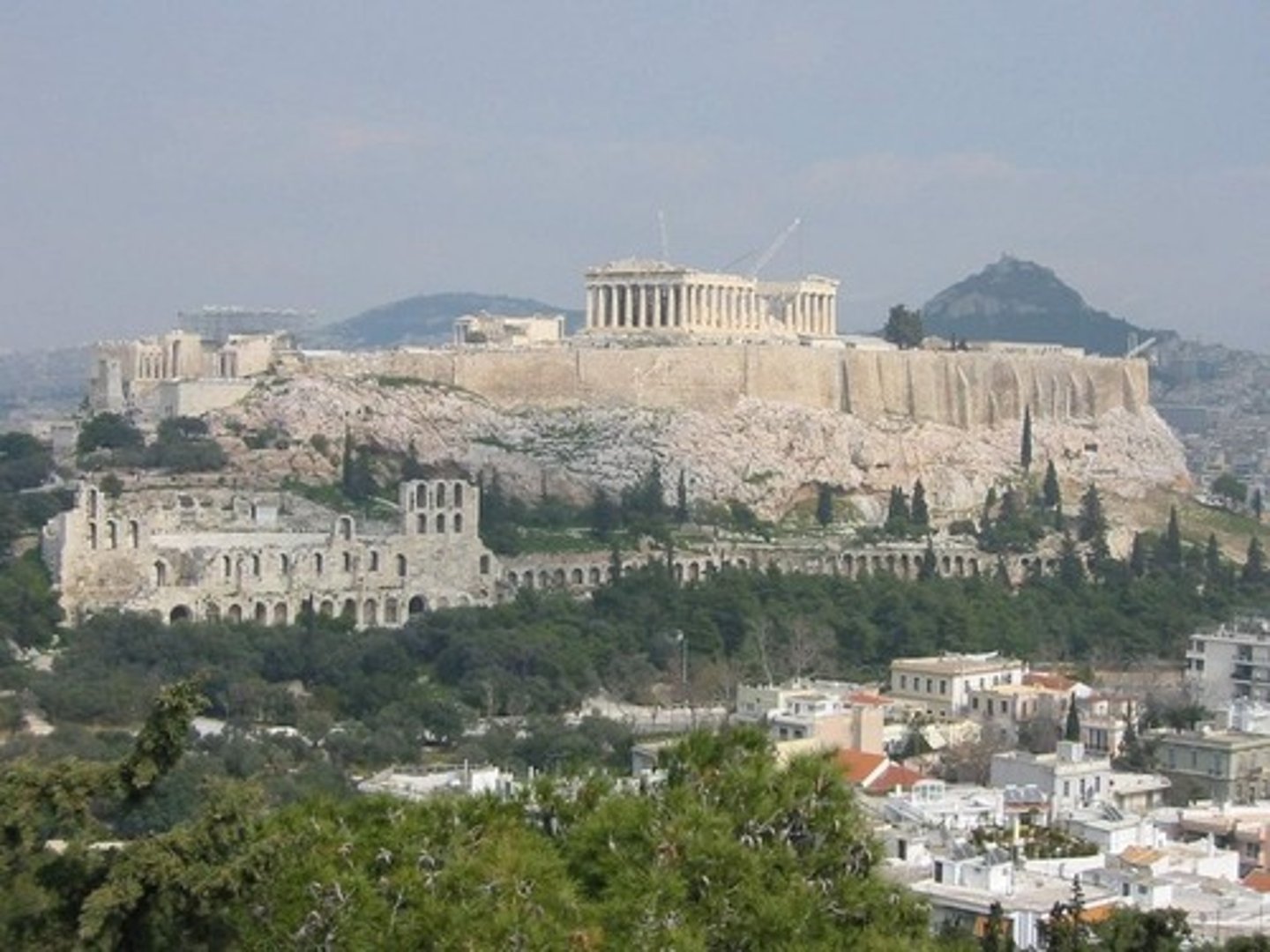
Erechtheum
- 421-407 BC, Classical Period, Athens, Greece (Acropolis)
- IONIC temple of Athena
- Significance: built to remember Athens' ORIGIN (legendary Kind Erectheus), shows architectural prowess (built on levels)
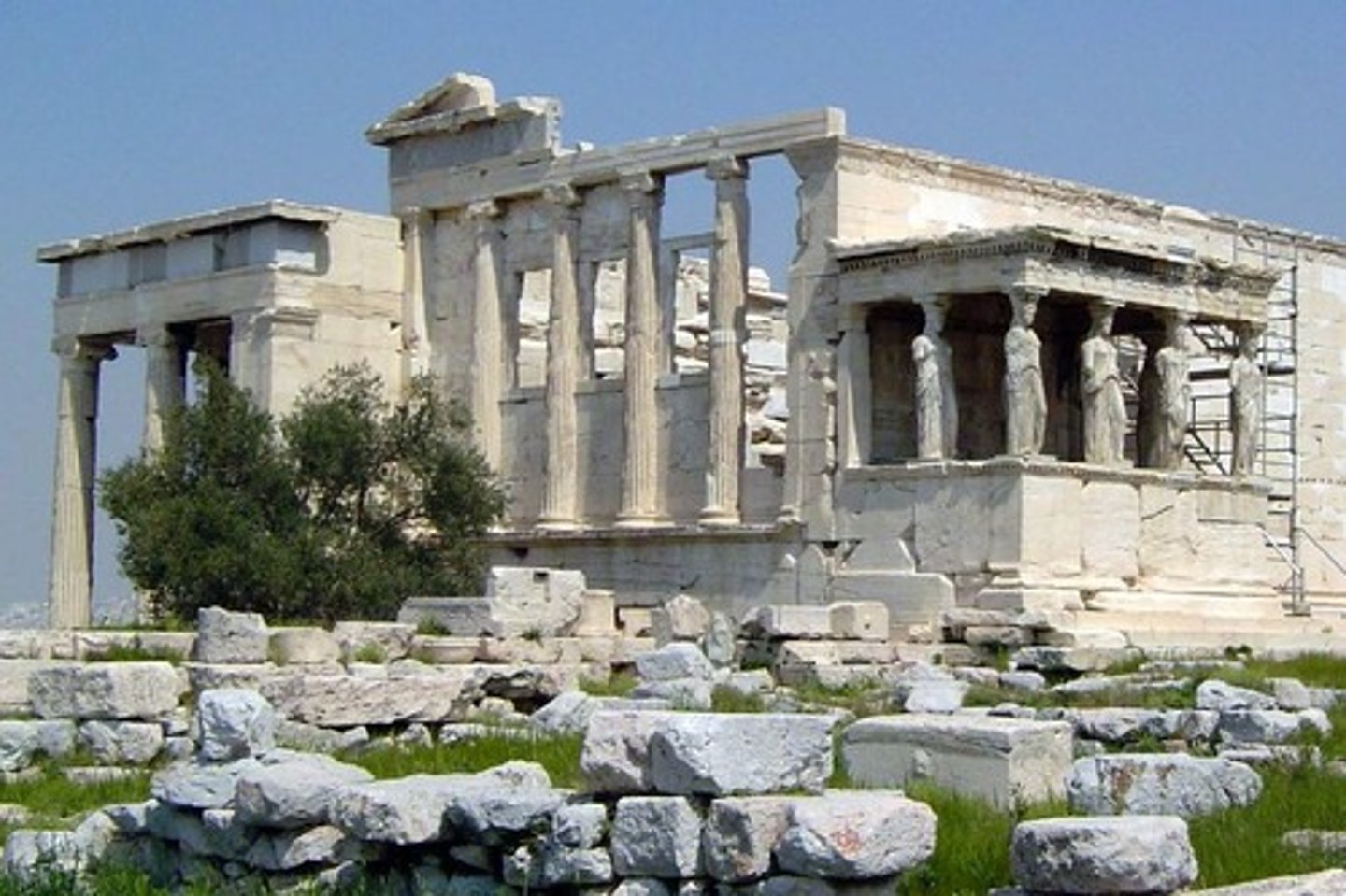
Parthenon
- 477-432 BC, Classical Period, Athens, Greece (Acropolis)
- Temple dedicated to Athena --> reflects Athenian religious beliefs and customs
- DORIC columns --> simples type of Greek column
- Built under the leadership of PERICLES by architects Ictinus and Callicrates
- Phideas wanted to create a message regarding Athens' RECAPTURED POWER and superiority (after DEFEATING PERSIA)
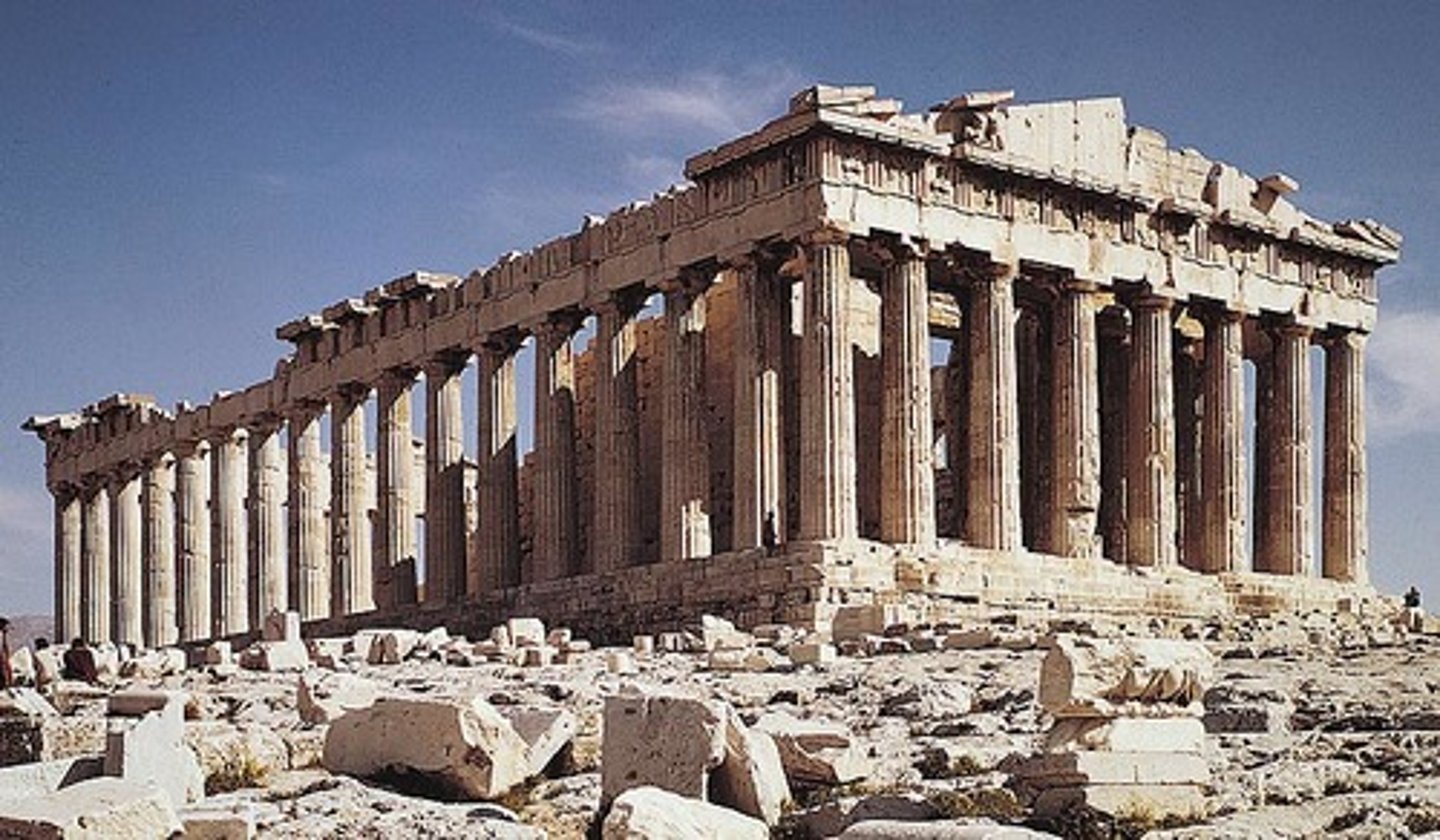
Architects of the Parthenon
Ictinus and Callicrates
Sculptor of Parthenon
Phidias (Elgin Marbles)
Acropolis, Propylae & Temple of Athena Nike
- 437-420 BC, Classical Period, Athens, Greece (Acropolis)
- Significance: reflects Athenian advancement, resources, wealth, and religious beliefs --> ENTRANCE, importance of AHENA and association with VICTORY as a whole
Temple of Athena Nike
- c. 422 BC, Classical Period, Athens, Greece (Acropolis)
- Shows Athenian religious beliefs
- Contains Ionic columns
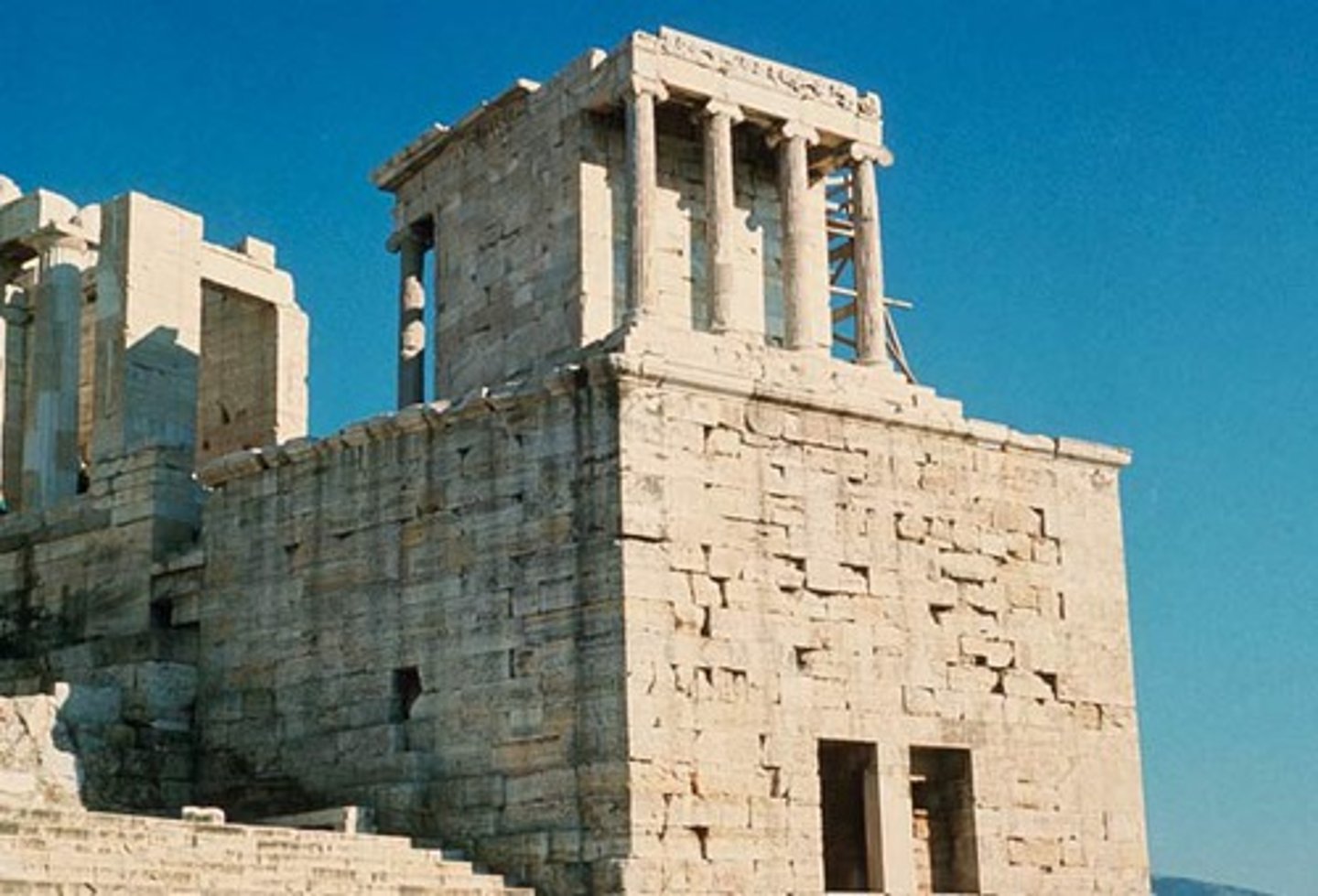
Ionic
- Intermediately detailed Greek column
- Looks like a fancy scroll at the top
- Found in the Temple of Athena Nike (c. 422 BC, Classical Period, Athens, Greece --> Acropolis)
Doric
- Type of Greek column found in the PARTHENON
- Simplest Greek column
Corinthian
- Most complex style of Greek column
- Elaborate designs at the top, skinniest of 3 column types
Alma-Tadema, Phideas Showing the Frieze of the Parthenon to Pericles, Aspasia, Alcibiades and Friends
- 1868
- Shows Phideas creating Frieze of Parthenon --> commissioned under Pericles and demonstrates Athenian religious/cultural beliefs
Parthenon and Athenian Propaganda
- West metopes: Amazonomachy (battle against the Amazons) --> most occurring motif
- Women fighting was EVIL and monstrous --> Greek heroes foought them (Achilles and Heracleus both fell in love)
- Athena Parthenos' shield: Amazonomachy (battle against the Amazons)
- South metopes: Centauromachy (fight against centaurs)
Theseus
- HERO of ATHENS (mythical) --> considered king who brought civilization to Athens by killing minotaur
- Defeated "barbaric" Amazons
West metopes of the Parthenon with Amazonomachy
- 446-440 BC, Classical Period, Athens, Greece (Acropolis)
- Shows battle against the Amazons
- Significance: Amazons were women that fought and had power --> Greek man's worst enemy and associated with Persians --> many heroes fight against the Amazons and Theseus' victory over the Amazons even became a symbol for Athenian victory over the persians
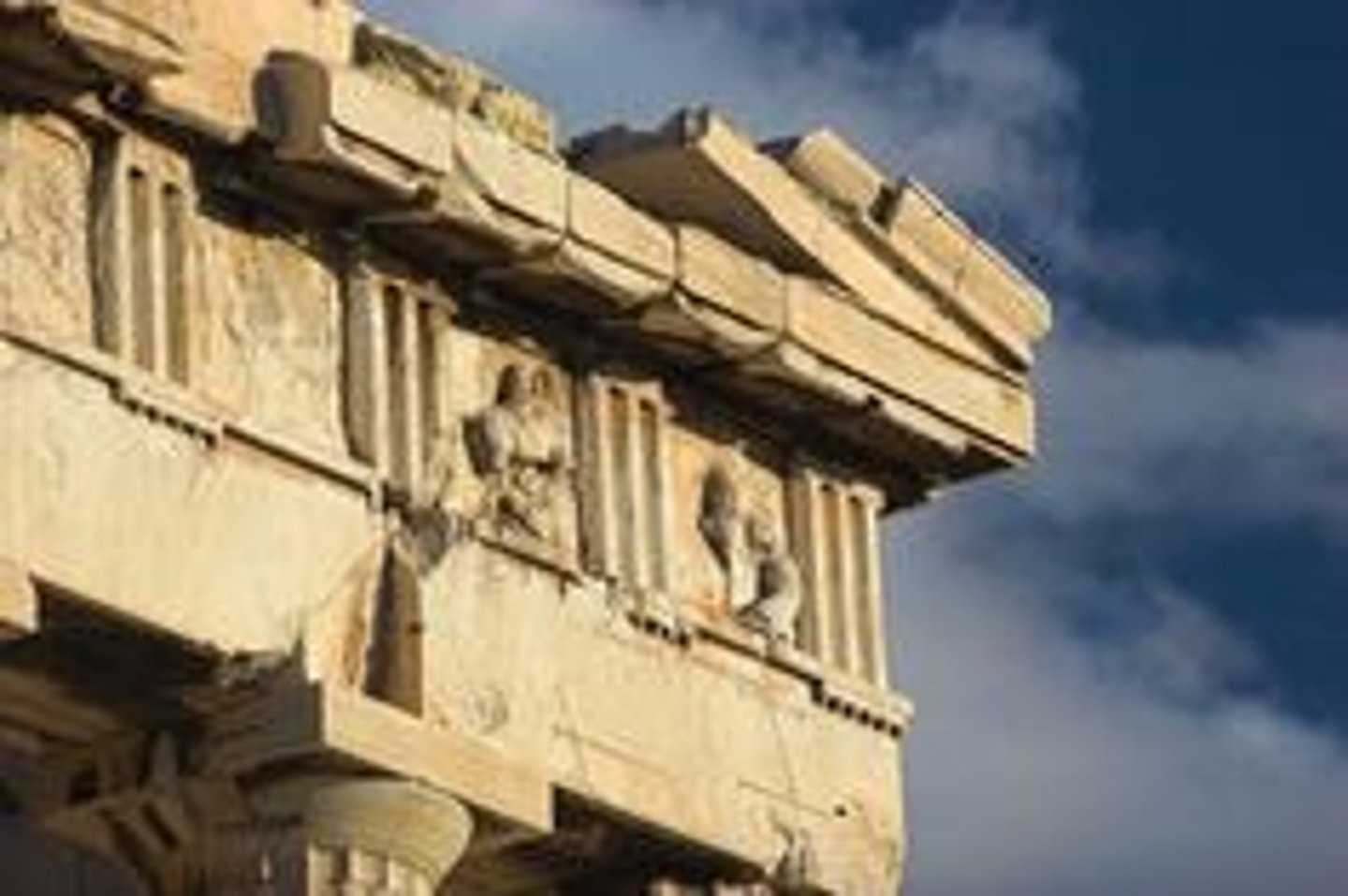
Shield of the Athena Statue by Phidias: Amazonomachy on Exterior
- c. 447 BC, Classical Period, Athens, Greece
- Significance: Amazonomachy --> symbolic of Athenian victory over Persians (compared to Theseus' victory over Amazons) and reflects Greek view of women (should NOT fight)
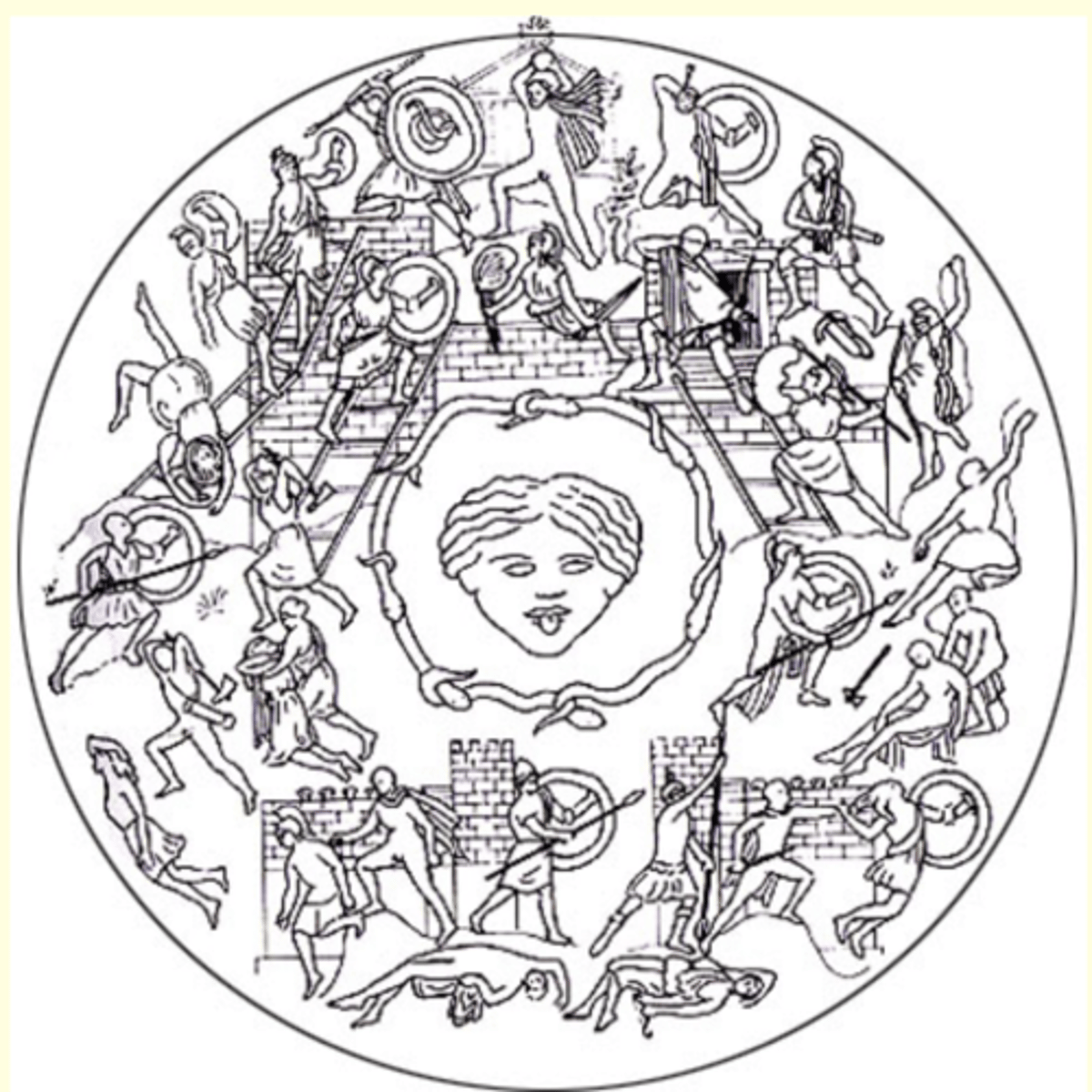
Amazonomachy
- Battle against the Amazons
- Many heroes fight against the Amazons: Achilles, Heracles, Theseus
- Theseus' victory over Amazons SYMBOLIC of Athenian victory over the PERSIANS
Frieze of the Mausoleum of Halicarnassus: Amazonomachy
- c. 350-333 BC, LATE Classical Period
- Significance: Amazonomachy --> shows Greeks defeating Amazons which are often associated with Persians and also reflect how women should NOT behave in Greek society
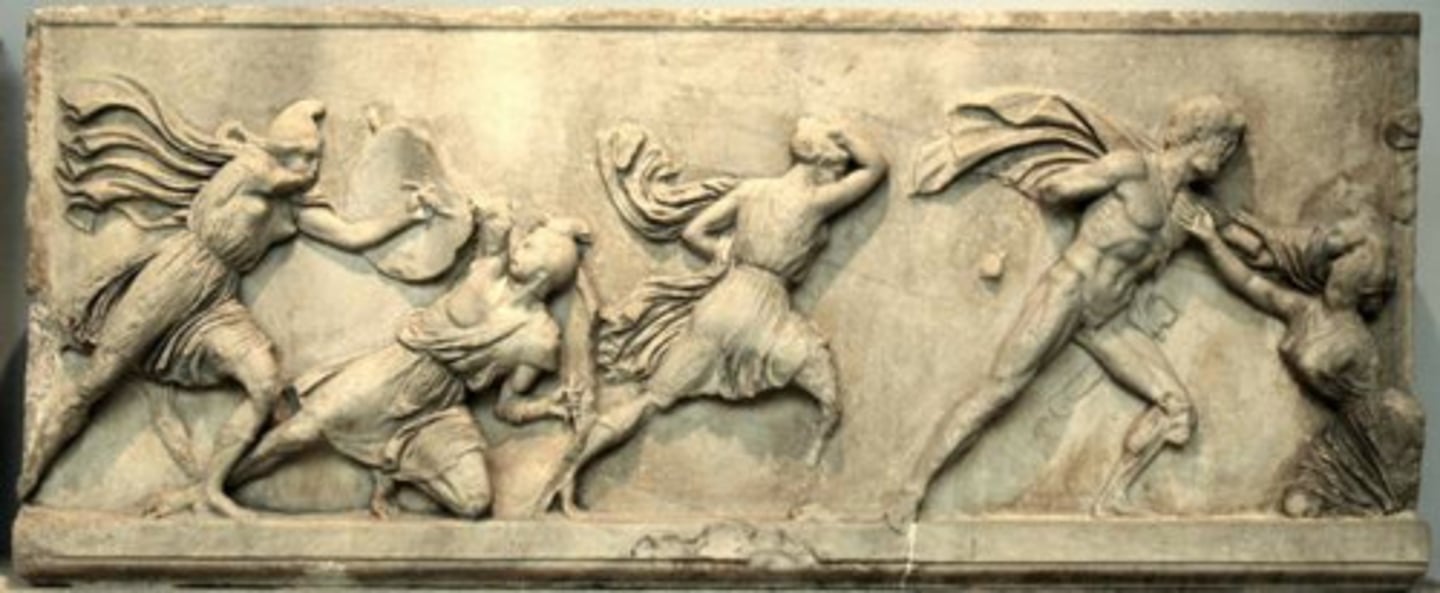
Increasing Tensions (Peloponnesian War)
- 460-445 BC: First Peloponnesian War --> increasing rivalry between Athens and Sparta
- Increasing rivalry between Athens and Corinth
- 445 BC: Thirty Years' Peace between Athens & Sparta --> for status quo --> no reciprocal interference with allies
- 431-404 BC: Second (and FAMOUS) Peloponnesian War
First Peloponnesian War
- 460-445 BC
- Increasing rivalry between Athens and Sparta (more skirmishes than all out war)
- Increasing rivalry between Athens & Corinth
- 445 BC: 30 Years' Peace between Athens and Sparta --> maintain status quo and allow continued power over respective allies (ATHENS EAST and Sparta West)
Second Peloponnesian War
- 431-404 BC (FAMOUS)
- Athens vs. Sparta
Thucydides (460-400 BC)
- Elected stratēgos (general) in 424 BC
- Exiled for 20 years in 424 BC (lost)
- Knows the end of the Peloponnesian war but history breaks of in 411 BC --> died before completion?
- INTERPRETER of the Peloponnesian War
- Claimed to have seen what happened on BOTH sides because of exile from Greece (particularly on Peloponnesian side)
Thucydides' History of the Peloponnesian War: 5 parts
1. Introduction (Book 1)
2. The 10 Years' War (Archidamian War) in 431-421 BC (Books 2.1-5.24)
3. Precarious peace (Book 5.25-end)
4. Sicilian Expedition in 415-413 BC (Books 6 and 7)
5. Decelean War in 413-404 (Book 8) --> INCOMPLETE (reaches until 411 BC)
Where does Thucydides' History of the Peloponnesian War end, despite him being alive for the whole war?
- 411 BC
Thucydides' Introduction (Part 1, Book 1)
- Importance of "this" war (1.1)
- Archaeology from Trojan War to present (1.2-1.9)
- Thucydides' historical METHODOLOGY (1.20-23) --> claims to have used only the "plainest evidence" and to have reached "conclusions that are reasonably accurate"
- Claims to write REAL HISTORY based on EVIDENCE (unlike poets or prose chroniclers)
- Aim and theory: work was done to LAST FOREVER and NOT for the taste of the IMMEDIATE PUBLIC (hopes his history will be useful to future generations)
Mythōdes
- "Fantastic" or "mythical"
Ktēma es aiei
- Possesion for ALL TIME (goal of Thucydides' history)
Problems in Thucydides' Methodology
- Speaks about TROJAN WAR, MINOS, Agamemnon, Helen Pelops, Heracles --> all MYTH (uses to show how important Peloponnesian War was)
- Homer's figures are likely exaggerated because of his status as a poet --> inclusion in Thucydides' History of the Peloponnesian War calls into question his claim of writing "real history" without mythical element
- CLAIMS to use SPEECHES delivered during the war to analyze political situation --> actually wrote his own version of each speech because he couldn't remember exact speeches --> subject to BIAS (his OWN WORDS rather than the those of the "speakers")
What was the real cause of the Peloponnesian War, according to Thucydides?
- Growth of Athenian power and the FEAR that this caused SPARTA (Athens was newer and smaller but growing fast)
- Immediate pretexts (aitiai) vs. underlying/real causes (prophasis)
Prophasis
- UNDERLYING CAUSE
- Peloponnesian War PROPHASIS (according to Thucydides): Spartan FEAR of growth of Athenian power
Aitiai
- IMMEDIATE PRETEXTS
- Peloponnesian War AITIAI (according to Thucydides): disputes over minor states (Epidamnus, Corcyra, Potidaea, Megara) escalate into confrontation between major states (Athens, Sparta, Corinth)
Phases of the Peloponnesian War
- Archidamian War (431-421 BC)
- Peace of Nicias (421-413 BC)
- Decelean War (413-404 BC)
Archidamian War (Phase 1, 431-421 BC)
- 431 BC: Spartan King Archidamus' INVASION of Attica
- 430/429 BC: Plague and DEATH of PERICLES
- 428-427 BC: REVOLT of MYTILENE and CIVIL WAR at CORCYRA
- 424 BC: Brasidas in Chalcidice (stratēgos Thucydides in exile)
- 422 BC: Battle of AMPHIPOLIS: Brasidas and Cleon DIE
Peace of Nicias (421-413 BC)
- 416 BC: DESTRUCTION of MELOS
- 415-413 BC: Athenian invasion of SICILY
Decelean War (413-404 BC)
- 411/410 BC: OLIGARCHIC REVOLUTION in Athens
- 404 BC: SPARTA DEFEATS Athens (with Persian help)
- Spartans occupy Decelea --> continuous raids in Attica
- Rebellions against Athens in the Aegean
- PERSIAN satrap Tissaphernes negotiates with SPARTA and then with ATHENS (establishing oligarchy) then AGAIN with SPARTA
- Sparta becomes SEA POWER
Pericles' Strategy (Peloponnesian War)
- LAND power (SPARTA) vs. SEA power (ATHENS)
- Retreat into the city and abandon Attica (can't defeat Spartans on land anyway)
- Avoid engaging Peloponnesians on land (fight only in sea --> fleets)
- Raid coast of Peloponnesus using ships
Pericles' Funeral Speech (Thucydides, History of the Peloponnesian War)
- Ritual of public funeral for war dead --> Pericles chosen as speaker
- "Way of life that has made us great" (Thucydides, 2.36)
- Death of war heroes becomes an opportunity to define what it means to be an Athenian --> PROPAGANDA to boost ATHENIAN self-image and spirit
- Athens as opposite (ANTITHESIS) of Sparta
- "Taking everything together then, I declare our city is an education to Greece" (Thucydides, 2.41) --> Spoken by Pericles at Funeral Oration
Pericles on Athens vs. Sparta (Thucydides, History of the Peloponnesian War)
- Athenian DEMOCRACY (dēmokratia) vs. Spartan Oligarchy
- Athenian EQUALITY (isonomia) vs. Spartan Inequality
- Athenian FREEDOM (eleutheria) vs. Spartan Lack of Freedom
- Athenian RESPECT for LAW (because laws are just --> followed willingly) vs. Spartan ENFORCED RESPECT for law
- Athenian FESTIVITY and RELAXATION vs. Spartan Constant Military Training
- Athenian OPENNES (secure in society) vs. Spartan Secrecy/Closed Society
- Athenian NATURAL COURAGE (love way of life, defend it) vs. Spartan State-Induced Courage
- Athenian love of PHILOSOPHY & ARTS (time for leisure for general population) vs. Spartan Lack of Philosophy & Arts
- Athenian INTEREST in Private Business AND POLITICS (supposedly open to all) vs. Spartan Interest ONLY in Private Business (hated subjects, only small group in power)
- Athenian WORDS and Deeds (Assembly important, rationality) vs. Spartan ONLY deeds (out of ignorance)
- Athenian GOOD DONE to OTHERS vs. Spartan Good Received from Others
Thucydides on Athens vs. Sparta in the FUTURE
- Sparta: future generations would find it difficult to believe that Sparta had really been so powerful
- Athens: easy to conjecture that city had been 2x as powerful as it actually was
Dēmokratia
- Democracy (Athenian)
Isonomia
- Equality (Athenian)
Eleutheria
- Freedom (Athenian)
Parrhēsia
- Freedom in speech
- Every citizen's right to address his fellow citizens in the POLITICAL ASSEMBLIES (Athens)
- Freedom in speech and ability to speek in Assembly meant it is NECESSARY to know how to speak (RHETORIC) --> present proposals to Assembly and defend oneself in front of a jury (no lawyers)
Bēma
- Speaker's platform
Sophistēs
- One who exercises WISDOM (Sophists)
- Itinerant (mobile, NOT at university) --> TEACHERS of higher education
Sophists
- Sophistēs: one who exercises wisdom
- Itinerant teachers of higher education --> teach RHETORIC and VIRTUE (ARETĒ)
- Charge FEES for teaching (highly frowned upon)
- Important Sophists: Protagoras, Gorgias, Prodicus, Antiphon
- Great stress on the force of PERSUASION (GORGIAS)
School Scenes (cup by Douris)
- c. 480 BC, Classical Period, Athens, Greece
- Significance: Sophist Revolution of the 5th century --> Sophist teaching created huge controversy and social tensions in Athens and Gorgias was a major Sophist figure
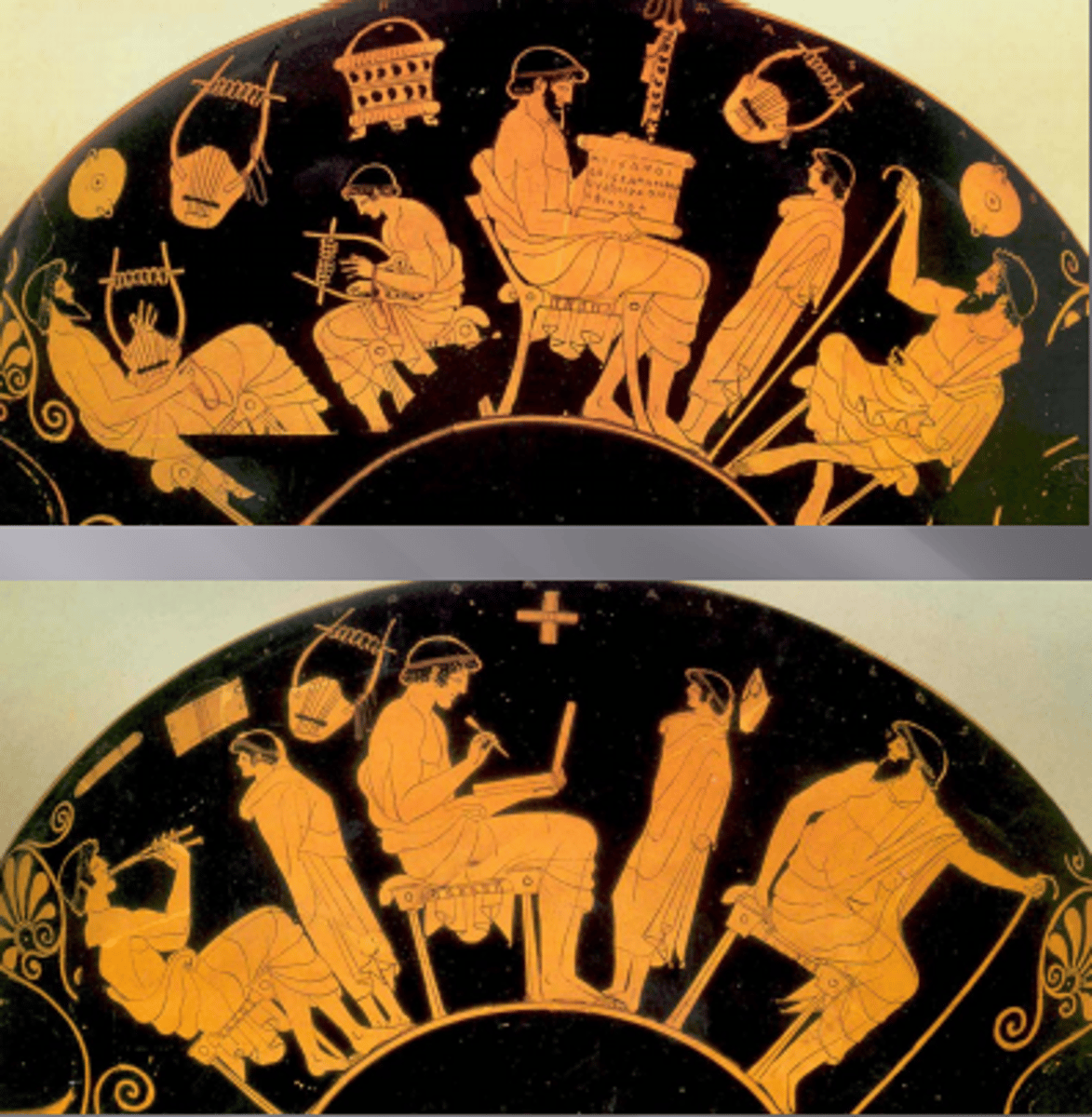
Aretē
- Virtue
- Taught by Sophists for money
Sophists and Rhetoric
- Great stress on the force of PERSUASION (especially Gorgias)
- Dialectic method (questions to find answer)
- Antilogic method (ability to argue BOTH sides of the case)
- Main goal: to WIN the argument --> to make weaker argument stronger (right and wrong irrelevant)
Dialectic Method (Sophism)
- Asking questions to get to the answer
Antilogic Method (Sophism)
- Ability to argue BOTH sides of the case (regardless of right/wrong --> trying to WIN)
Cultural Relativism
- If everything depends on PERSUASION --> there is NO absolute TRUTH
- SOPHISM
Ethical Relativism
- Individuals SUBJECTIVELY decide what is right/wrong for THEMSELVES
- SOPHISM
Sophists & Relativism
- Cultural Relativism (no absolute truth if everything depends on persuasion) --> Ethical Relativism (no absolute truth so individuals decide what's right/wrong for themselves; subjective) --> Religious Agnosticism or Atheism (no absolute truth = no gods/divinities) --> Protagoras ("Man is measure of all things")
Protagoras (Sophist)
- Claimed that "Man is a measure of all things" --> reflects RELATIVISM
Physis
- Nature
Nomos
- Law, convention
- From nomizō ("I think," "I believe," --> "what the people believe")
Physis vs. Nomo
- Nature (physis) vs. law/convention (nomos)
- Seen in Euripides' Bacchae
- Sophists are Physis
Maenad (Attic white-ground cup)
- c. 490 BC, ARCHAIC Period, Athens, Greece
- Maenads were followers of Dionysus --> physis vs. nomos debate which is relevant to Sophist teachings (rejected convention --> physis)
Physis & Nomos in RELATIVISTIC ETHICS
- Justice: inborn characteristic of humanity (physis) OR convention (nomos) invented by weaker as defense against stronger
- If Justice is a CONVENTION --> Right and Wrong are merely matters of convention (nomos) and inherently go against nature
- Nature/physis: superior individuals win over the weak --> superior individuals must pursue their own advantage (contradicts justice)
Charges AGAINST Sophists
- Negative view mainly derived from PLATO and ARISTOTLE --> believed sophistry to be unsound argumentation
- Charge 1: Sophists have NO INTEREST in TRUTH and only care about WINNING the argument (right or wrong)
- Charge 2: Sophists teach "virtue" (aretē) for MONEY to anyone who pays --> challenge aristocratic view that virtue cannot be taught and make it more widely accessible
Realpolitik
- Real Politics (& power politics)
Mytilenian Revolt (428-427 BC)
- Special status of Lesbos and Chios --> only Athenian "allies" to have a fleet
- Mytilene rebels against Athens and appeals to Sparta --> Mytilenian ambassadors sent to Olympia (Thucydides 3.8-15)
- Mytilene SURRENDERS to ATHENS (Thucydides 3.27-28)
- Peloponnesians arrive too LATE (Thucydides 3.29-33)
- Leaders of revolt are sent to Athens as prisoners --> Mytilenian ambassadors also present (Thucydides, 3.35)
Mytilenian Debates
- First Debae (Thucydides 3.36): Athenians decide to punish Mytilene harshly and EXECUTE ALL ADULT MALES, enslave women and children (NO SPEECH in Thucydides)
- Second Debate: Athenians revisit issue decided in first debate --> CLEON argues for HARSH punishment and DIODOTUS argues to punish ONLY LEADERS (Diodotus WINS)
Cleon on Free Speech (Mytilenian Debate)
- City is better of with BAD but FIXED LAWS than with good laws that are constantly altered
- States are better governed by man in street than by intellectuals
- Athenians have become "regular speech-goers" and only listen to accounts of action --> like listening too much and are more of an audience listening to a lecturer than parliament talking about matters of the state
- Claim: Athenians judge matters by FANCY SPEECHES (logoi) rather than by FACTS (erga)
- Cleon himself was a demagogue and a skilled orator --> using his own speaking skills to criticize obsession with speeches in Athens
- Contradicting Pericles
Logoi
- Speeches
Erga
- Facts
- Dēmagōgos
- Leader of the people (demagogue)
Diodotus on Free Speech (Mytilenian Debate)
- People against words as "guide to action" are either fools or someone with personal interest at stake
- Should NOT accuse speakers based on getting paid --> will cause counsellors to fear giving advice
- Claim: democracy NEEDS DISCUSSION and Athenians should NOT be overly SUSPICIOUS of speakers' MOTIVES (aligns with PERICLES)
Cleon on Mytilene
- Mytilenians were not subject but were FREE --> had NO REASON to REVOLT and instead were acting in deliberate AGGRESSON
- Harsh punishment must be used as a DETERRENT
- Guiding principle of international relations: SELF-INTEREST
- It is RIGHT to PUNISH Mytilenians' crime and also USEFUL to Athens
- Claim that it is "right" to punish Mytilene reflects pillars of JUSTICE (not found in Sophist argument of Diodotus)
Cleon on Human Nature & Politics
- "General rule of human nature that people despise those who treat them well and look up to those who make no concessions" --> harsh to garner respect
- If same punishment is given to people who are forced to revolt by enemies (Sparta) and those who do so by their own free will --> everyone will revolt because success means freedom and failure doesn't result in major consequences
- Must make an example of Mytilene to other allies
3 Things AGAINST Imperial Interests (Cleon)
1. "To feel pity"
2. "To be carried away by the pleasures of hearing a clever argument"
3. "To listen to the claims of decency"
- Philanthropy means surrendering empire
Diodotus on Mytilene
- Guiding principle: SELF-INTEREST (like Cleon)
- AGAINST HARSH punishment but NOT based on empathy
- Death penalty does NOT DETER --> men always take risks in hope of gaining advantage
- Other allies and democracies would be ALIENATED by harsh punishment from Athens
- USEFUL for Athenians to NOT punish HARSHLY
Diodotus on Human Nature and Politics
- Cities/individuals are disposed to do WRONG by NATURE --> no law will prevent it (SOPHISM)
- NOT based on PITY or ordinary decent feelings (like Cleon)
- Doesn't matter whether they're GUILTY OR NOT --> only SELF-INTEREST MATTERS --> "how Mytilene can be most usefuol to Athens"
- Does NOT care about JUSTICE --> SOPHISM
- Should not act "like a judge who strictly examines a criminal" (justice) --> should focusing on securing "full use of those cities" that bring Athens important contributions
- Men are inherently disposed to do wrong, no law can prevent it
Thucydides on Athenian Democracy
- Thucydides' opinions can be deduced from speeches --> truly voicing his own views
- Percles' Funeral Oraton: idealized portrait of Athenian Democracy
- Mytilenian Debate: harsh CRTIQUE of Athenian democratic politics --> deceptive rhetoric and guiding principles that a) humans are bad by nature, b) pity and decency have no place in politics, and c) self-interest & usefulness are the only rules to follow
- Did Thucydides support Realpolitik (Machiavelli, Hobbes, Kissinger) or was he critiquing Athenian Imperialism?
Plague at Athens (430-428 BC)
- From Piraeus to Athens --> potentially a form of typhoid fever, smallpox, or real plague
- THIRD of the population DEAD --> including PERICLES
- Thucydides caught plague and recovered (people didn't get it twice)
Thucydides & Hippocrates
- Hippocrates of Cos (c. 470-400 BC) vs. Hippocratic Corpus
- Medicine is profane and therefore RATIONAL --> against religion and magicians
- Symptoms --> diagnosis --> prognosis & treatments (diet, exercise, drugs, surgery)
Gignōsco
- To know
- Where word "prognosis" is derived from
Thucydides on the Plague
- Symptoms: burning feelings in head, sneezing, hoarseness, stomach, death on 7th or 8th day
- Treatment: NONE
- Immunity: no one got it twice
Thucydides' "Scientific" Method
- Wrote down symptoms of plague (having had it and survived) in order for people to recognize it if it ever broke out again
- Relates to his view on history --> wanted to document events so that people could use knowledge of past to deal with future events that would likely repeat past occurrences (human nature)
Thucydides: Social Consequences of Plague (Book 2)
- State of unprecedented lawlessness --> acts of SELF-INDULGENCE in the open (previously more discrete)
- MONEY SPENDING: quickly and on pleasure --> people figured they'd die soon anyway
- NO HONOR --> doubtful anyone would survive to enjoy the name for it
- "No fear of god or law of man had a restraining influence" --> people reverted to physis when they believed they'd die quickly regardless
- Worshipping gods didn't seem to matter --> good and bad died indiscriminately
Civil War at Corcyra (427 BC)
- Civil war between DEMOCRATIC and OLIGARCHIC parties
Thucydides on Corcyra: Human Nature at War
- People went to every extreme and beyond it (typical in situations of war and death) --> fathers killed sons, men dragged from temples/butchered on altars
- HIGH STANDARDS are followed when cities are in times of PEACE because people aren't forced into situations where they don't have to do what they don't want to --> "War is a stern teacher" (Thucydides, 3.82)
- When CONVENTION is LOST (thrown into confusion) --> HUMAN NATURE (physis) will show itself in its "true" colors as "incapable of controlling passions" (even when laws exist --> physis OVER nomos)
Thucydides on Corcyra: Language as Expression of Social Change
- Words CHANGE usual MEANINGS
- "Thoughtless act of aggression" becomes "courage" of a party member
- Think of future/wait now simply means COWARD
- Moderation is merely a disguise for UNMANLY character
- Ability to understand a question from all sides means someone is totally UNFITTED for ACTION
- Real man: FANATICAL ENTHUSIASM
- Plotting against an enemy behind his back is SELF-DEFENSE
- TRUST VIOLENT OPINIONS and suspect anyone who objected them (Thucydides 3.82)
- WORDS are CONVENTION (nomos) --> can be CHANGED to SUIT human NATURE (physis)
Thucydides' Social Physiology
- Human body = Social body
- FRAGILE human institutions (law, religion, language --> nomos) vs. EVIL human NATURE (physis)
- Disasters (plague, war, etc.) reveal human nature as it really is: selfish, violent, cruel
- Just like disease ravishes human body, war breaks down society and destroys convention for favor of physis (evil human nature)
Homo homini lupus
- "Man is a wolf to [his fellow] man"
- Thomas Hobbes's motto (from Plautus, Latin playwright)
Peace of Nicias (421 BC)
- 50 years of peace (in theory)
- Conditions: Athens keeps empire, Sparta restores Amphipolis and the Athenian interests in Chalcidic Peninsula, prisoners on both sides liberated
- Immediate PROBLEMS: Peloponnesian league meets to ratify peace --> Corinth, Boeotia, and Megara do NOT sign, Chalcidians refuse to surrender Amphipolis back to Athenians
- Athens has no motivation to carry out her part of bargain
- 417-416 BC: Nicias and Alcibiades elected stratēgoi
Destruction of Melos (416 BC)
- Melos: Laconian colony --> NOT ALLIED with EITHER Sparta or Athens
- ATHENS orders Melos to join DELIAN LEAGUE --> Sparta doesn't help
- Athens KILLS ALL men and enslaves all women and children (unlike decision in Mytilenian debate --> HARSH punishment --> reflects increasing depravity in war?)
Melian Dialogue (Thucydides 5.85-5.113)
- Athenian representatives & Melian Oligarchs
- Like a DRAMA (tragedy), not a piece of historiographical prose
- Premises: SELF-INTEREST (not justice) as leading criterion for negotiations, no fancy speeches and focus on FACTS
- Athens argues on basis of physis --> strong can do what they want to weak, best interest of both is for Athens to take power over Melos (Natural law: everyone who wants to rule can rule) --> HOPE and HONOR IRRELEVANT (like Diodotus)
- Melos argues that slavery and forced submission are NOT in their self-interest --> turns to HOPE and HONOR of Spartans/JUSTICE defended by Gods --> call for no fancy speeches and only fact (like Cleon)
Natural Law of Imperialism
- "General and necessary law of nature to rule whatever one can" (Thucydides 5.105) --> Athenian representatives in Melian Dialogue
- Athenian representatives claim that anyone (including Melians) who had the same power would act the same --> NATURAL (physis)
Cleon & Pericles on Athenian Imperialism
- Cleon: "empire is a tyranny exercised over subjects who do not like it" --> subjects are always plotting against you and leadership depends on SUPERIOR STRENGTH not on goodwill of subjects
- Pericles: "empire is now like a tyranny: it may have been wrong to take it; it is certainly dangerous to let it go" ---> dangers arising from hatred incurred by acquiring empire
Sicilian Expedition (415-413 BC)
- Pretext (AITIAI): to help Egesta/Segesta against Selinus (Spartan ally)
- Real reason (PROPHASIS): to CONQUER Sicily
- Nicias (Athenian general) vs. Alcibiades (also an Athenian general originally but destroyed Hermae and was exiled --> turned to SPARTAN side and helped Sparta help Syracusans)
- Athenians were IGNORANT of size of island and number of inhabitants --> didn't realize they were taking on a war of almost the same magnitude as Peloponnesian War itself (THUCYDIDES)
Nicias
- Sought to get Athenians to put LESS money into expedition by asking for much more at Assembly --> Athenians instead sent HUGE FLEET
Segesta, Temple
- 420-409 BC, Classical Period, Segesta
- Greeks used pretext of helping Egesta/Segesta against Selinus to embark on expedition to conquer Sicily
